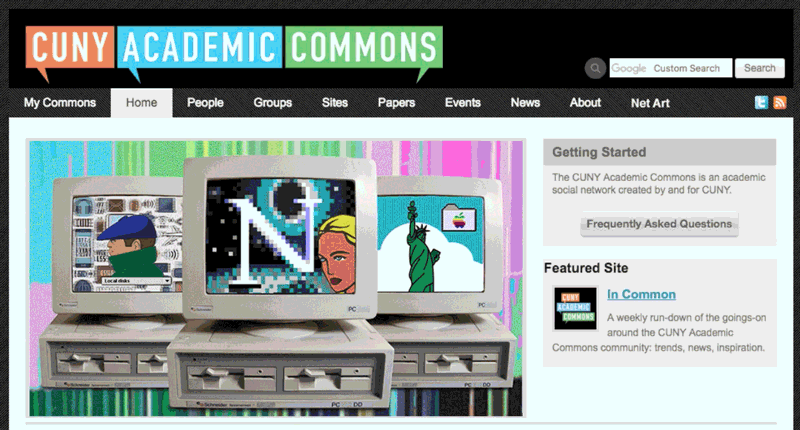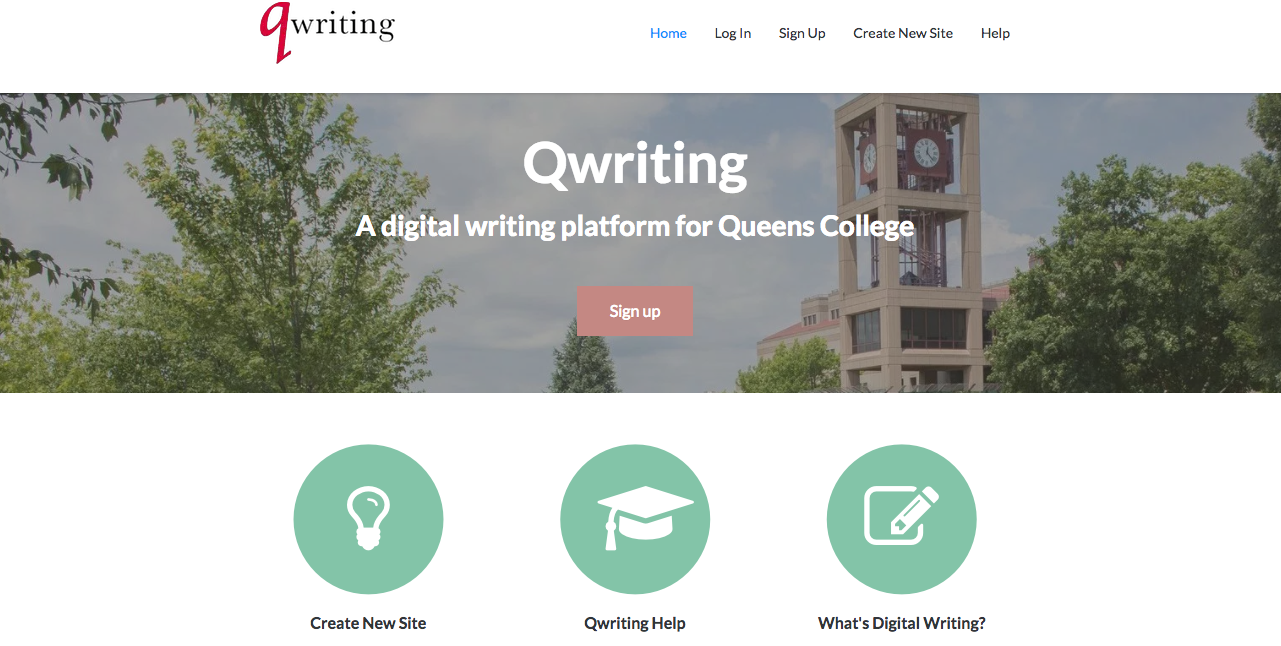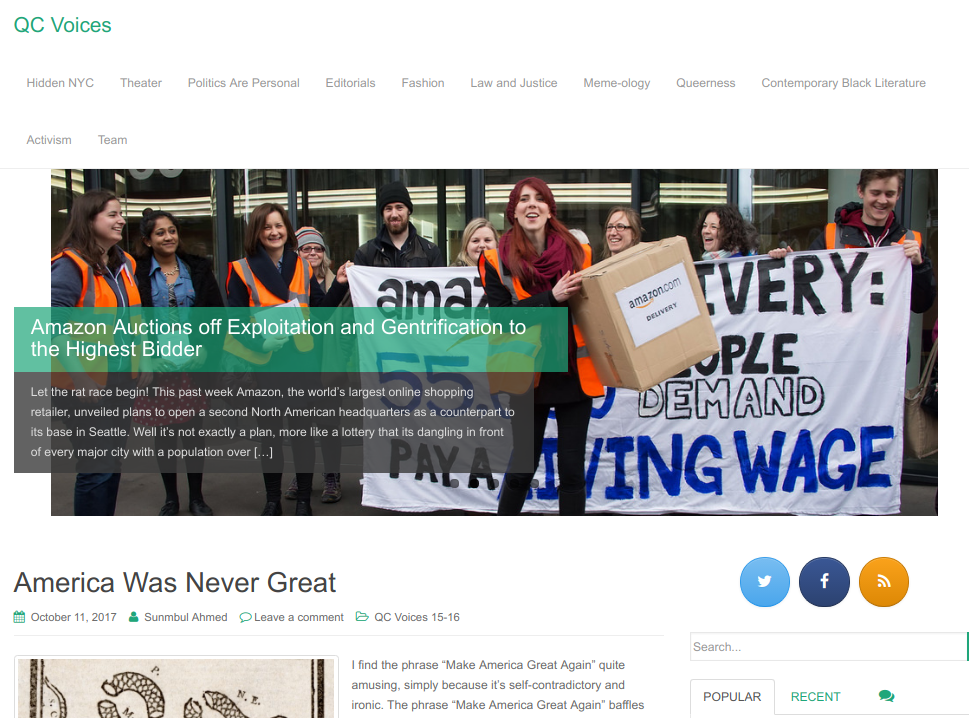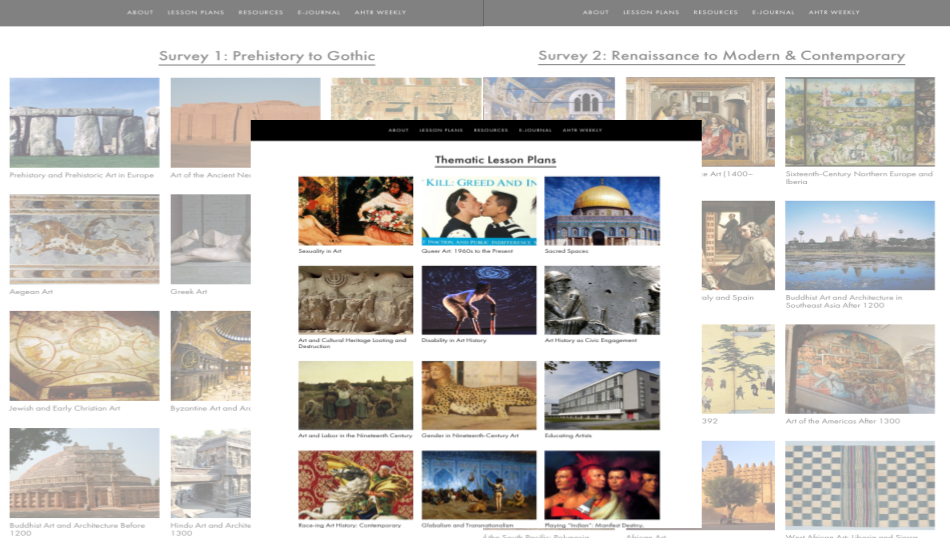pedagogy
Spotlight: Ryan Seslow and NET-ART on the CUNY Academic Commons
On 13, Nov 2017 | In Spotlight | By Jojo Karlin
Creator: Ryan Seslow
Project: NET-ART Course & Gallery on the CUNY Academic Commons
Discipline: Communication Technology, Digital Art, Digital Storytelling
Campus: York College
Follow: @ryanseslow

Description:
Over the last 8-10 months I have become an active contributor on the CUNY Academic Commons. (I have also proudly joined the commons’ sub-committee) I think it is a wonderful platform! I see the commons itself is an amazing space for activating creativity and collaboration between CUNY campuses, students, faculty and community members. After some research, ah, yes, I was a “commons voyeur” for a few years to learn and watch what was happening and how I could best contribute something new and of value.
I decided to create the NET-ART course on the Commons.
It began as a disruption (and still does) to the sidebar of the commons’ home page. Every other day I post a new animated GIF or a screen recorded series of Internet Art works that are co-dependent on a web browser to display and archive the works. The animations serve as a colorful contrast to the regularly published content. NET-ART on the commons is indeed an expressive and experimental digital art course, digital art gallery, exhibition space and a platform for interdisciplinary collaboration. An official or formal announcement about the NET-ART course launch has not yet been shared, but perhaps this Spotlight will serve as its introduction!
The Net-Art website on the commons will soon be launching its first series of open calls in three categories: Animated GIFs, Net-Art & Digital Art / Static / Memes!
This is the “hackable” course description:
“Net-Art is a remote online digital studio art course intended to expose and expand the vocabulary of new media art to the student’s personal visual statements. Students are expected to produce a related series of electronic art works with a concentration on experimentation and the transcendence of ideas. Through various processes, both manual and technology based, students will be exposed to the use and application of electronic media via desktop and mobile art practice. Students may reference their work in conjunction with prior interests in applied arts, photography, video, history, politics, social commentary, performance art as well as any other inter-disciplinary subjects of interest. The course will take place here on this URL using (OER) Open Education Resources, Public Domain and other Creative Commons Sources.”
Over the last several years I have been exhibiting and building online portfolios and repositories of my works:
Please have a look below for examples as they are relevant to the NET-ART Course work:
1. Professor Seslow’s Internet Art Exhibition on the Newhive platform – https://newhive.com/ryanseslow/profile/all
2. Professor Seslow’s Artist Profile on the Giphy Platform – https://giphy.com/ryanseslow/
3. Professor Seslow Art Repository on Flickr – https://www.flickr.com/photos/rmsmovement/
4. Ryan Seslow.com – https://ryanseslow.com – Lots of blog posts and otherness.
Spotlight: Equality Archive
On 16, Oct 2017 | In Spotlight | By Jojo Karlin
Creator(s): Shelly Eversley, Associate Professor, English, Baruch College, CUNY
Laurie Hurson, Ph.D. Candidate, Environmental Psychology, The Graduate Center, CUNY
Project: Equality Archive
Discipline: Feminist Archive, Digital Media
Campus: GC and Baruch
Follow: @EqualityArchive, @ShellyEversley, @Laurhur
The Equality Archive is a digital platform that hosts open access information about the history of sex and gender equality in the United States. Each archive entry contains intersectional and multimodal content in the form of text, images, sound, and video. In its collaborative and transformative approach, the Equality Archive marks a new direction for Open Educational Resources by offering multimodal educational content without copyright restrictions and builds on the feminist practice of collaborative work and socially transformative potential.
Written by a collective of over 25 feminists who are professors, artists, and authors, each archive entry is peer-reviewed and connects readers to opportunities to get involved through volunteering or donating to an established organization already working toward a social good that must include empowered women. As readers explore one entry, they will find connections–intersections–with other entries. They can browse the archive by searching via key words located in Equality Archive’s tag cloud or they can jump between entries through text hyperlinks, images, videos, and other media. By providing access to multimodal, open, and educational content, Equality Archive aims to share information and spark interest so that it can ripple outward, becoming a new wave of knowledge and action in the service of social good.
More information can be found in the Equality Project Statement: Equality Archive: Open Educational Resources as Feminist Praxis
Spotlight: QWriting 2.0
On 13, Oct 2017 | In Spotlight | By Jojo Karlin
Project director: Kevin Ferguson
Project: QWriting 2.0
Project type: Digital Pedagogy, Writing
Discipline: English
Campus: Queens College
Follow: @KevinLFerguson
Qwriting, a WordPress installation that serves the Queens College community, has over 19,000 users and hosts thousands of sites, including course blogs, student portfolios, and organizational pages. Qwriting 2.0 is a multiyear initiative to build on the Qwriting platform and the communities that rely on it. Over the past year, the Qwriting 2.0 initiative has included programs to support digital writing pedagogy, technical improvements to the Qwriting platform, increased support for teachers making use of Qwriting in their work, and increased support for student blogging initiatives such as QC Voices.
In spring of 2017, the Qwriting 2.0 team began a workshop series in digital writing pedagogy for instructors at Queens. This series, designed to show teachers in a variety of disciplines how best to deploy Qwriting and WordPress in their classrooms, engaged topics such as QWriting for Digital Assignments and Assessment and Strategies for Online Discussion, Annotation, and Collaborative Work. These sessions provide instructors with both the technical skills needed to use WordPress effectively and the space to consider how digital writing pedagogy can augment their own teaching practices.
To provide the Queens College community with a high-impact example of digital writing in practice, Qwriting 2.0 provides support for QC Voices, a flagship site that features student thought on issues such as queerness, social justice, equal representation in literature, and life in New York City. QC Voices highlights not only the diversity in perspective of Queens College students, but also their technical proficiency in both writing and modern digital rhetoric. The Qwriting 2.0 team maintains the site and guides and promotes the work of student bloggers as they create work that is routinely read by hundreds or thousands of visitors, both within and outside the Queens College community.
A critical part of the Qwriting 2.0 initiative is the ongoing evaluation and improvement of the Qwriting platform, including considerations of usability, aesthetics, and performance. In the last year, the Qwriting 2.0 team has made technical improvements to increase the speed of the platform, redesigned the site’s home page and documentation, and rethought the signup and site creation process to better serve common use cases. The team also actively encourages adoption of the platform through consultations, class visits, and office hours.
Spotlight: Art History Teaching Resources
On 05, Oct 2017 | In Spotlight | By Jojo Karlin
Project type: Digital Pedagogy
Campus: Baruch
Each academic year, AHTR publishes a series of blog posts on the AHTR Weekly, an increasingly popular feature at ArtHistoryTeachingResources.org. While these short essays primarily target art historians and museum educators, instructors in other disciplines now look to the Weekly for information about innovative pedagogies, open educational resources, and technology-enhanced teaching. Among topics slated for this year are “What’s Your Sutori? Interactive Study Guides and Active Note-Taking,” “Kimono Wednesdays,” “Bomb the Church,” and other effective Reacting to the Past (RTTP) games,” and “3D Printing.”
Some contributors have developed their Weekly posts into peer-reviewed publications for Art History Pedagogy and Practice, AHTR’s academic e-journal on scholarship of teaching and learning. At conferences, AHTR provides faculty opportunities for professional development and collaborative exchange. In October, AHTR will host a session “Pedagogically Sound Approaches for Hybrid and Online Learning,” at the Southeastern College Art Association (SECAC), and for the second year in a row, AHTR organized a round of lightning talks on teaching and learning for the College Art Association (CAA). These presentations, addressing the “State of the Art (History): Re Examining the Exam,” along with proceedings from our SECAC session will be shared and archived through reflection posts on the AHTR Weekly. AHTR is also excited to partner with CAA’s Education Committee this year on a one-day “boot camp” for faculty interested in conducting Scholarship of Teaching and Learning in Art History, and is planning a special issue of Art History Pedagogy and Practice focused on projects developing from this event.
Digital Humanities in the Classroom – Mark Sample and Shannon Mattern [video]
On 19, Nov 2011 | In Video | By Matthew K. Gold
The CUNY Digital Humanities Initiative is pleased to release video from our October 18, 2011 event on Digital Humanities in the Classroom with Mark Sample and Shannon Mattern. Please read our original announcement for more details on their talks. We’re very grateful to them for sharing their work with us!
Mark Sample, “Building and Sharing When You’re Supposed to be Teaching”
Shannon Mattern, “Beyond the Seminar Paper: Setting New Standards for New Forms of Student Work”






 Welcome to the blog of the CUNY DHI, an effort to build momentum and community around Digital Humanities practitioners at CUNY. We hope you'll join us at our upcoming events and that you'll follow this blog to hear about the latest news in the field.
Welcome to the blog of the CUNY DHI, an effort to build momentum and community around Digital Humanities practitioners at CUNY. We hope you'll join us at our upcoming events and that you'll follow this blog to hear about the latest news in the field.



Recent Comments